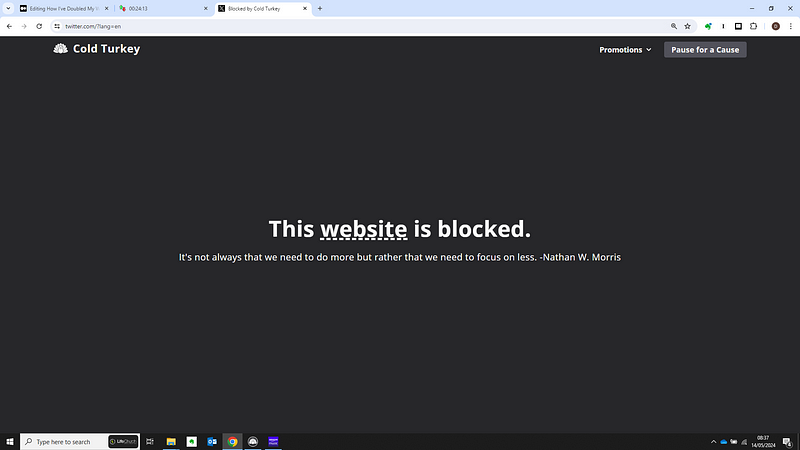Unlocking Your Writing Potential: How to Double Your Output
Written on
Chapter 1: The Transformation of My Writing Routine
If you're aiming to produce more written content, the immediate thought might be that you need to dedicate additional hours to your craft. However, what if I told you that this assumption is misleading? It's entirely possible to enhance your writing output without adding extra hours to your schedule. Skeptical? I was too, but I managed to publish 26 articles of 1,000 words each last month while balancing a demanding 9-to-5 job.
The key to my success lies in maximizing the effectiveness of the time I have available, and I want to share this game-changing insight with you.
The Big Idea
This concept was inspired by Cal Newport, an associate professor at Georgetown University, who remarkably doubled his output from four to nine professional papers while simultaneously authoring a book—all without sacrificing evenings or weekends for family time. His secret? Embracing the principle of deep work, which he elaborates on in his book by the same name. After reading it, I was left astounded; it outshines all other productivity literature. Why settle for marginal gains when you can dramatically elevate your productivity?
The takeaway is simple: you possess the capability to produce far more than you might believe. Deep work can be a transformative force for creators, potentially altering your life.
What is Deep Work?
Deep work refers to the ability to concentrate without distractions on a cognitively demanding task. This stands in stark contrast to shallow work, where we flit between tasks on our to-do lists, often succumbing to distractions like email notifications and social media. To create the highest quality work, one must commit to deep, focused sessions.
This may seem obvious, yet it is often overlooked. Just one hour of deep work can be more productive than an entire day of shallow tasks. I realized that much of my writing time was squandered; I'd jot down a few sentences only to get sidetracked by Twitter or aimlessly browsing the internet. In a typical 90-minute session, I found that I might only produce 17 minutes of actual writing.
You don't need more time; you need to make the most of the minutes you already have.
To illustrate how challenging this can be, I began scheduling one-hour deep work sessions with a few simple rules:
- Set a timer.
- Keep my phone in another room.
- Use the Cold Turkey app to block distracting websites.
- Listen to The Killers through my headphones.
Admittedly, during my first session, I was shocked to find that I had subconsciously clicked on Twitter after just seven minutes:

This highlights a crucial point: your brain is wired to seek distractions. According to Chris Bailey in "Hyperfocus," it takes approximately 27 minutes to regain focus after a distraction. This explains why we often feel unproductive.
However, with practice, I became better at maintaining focus during these sessions. I discovered that dedicating just one hour a day to deep work could yield 15 articles each month—a substantial output for any writer.
Why Deep Work Matters
The rapid evolution of digital technology is reshaping the economic landscape. In the past, success required substantial investment in labor and capital. Today, even with limited resources, individuals can create and market products effortlessly. Access to the global market is unprecedented, and as a writer, you can connect with a vast audience. However, the flip side is that consumers now have access to countless writers, making it essential to produce content of the highest caliber.
Quality is paramount. In a world where consumers can easily find exceptional content, producing mediocre work will no longer suffice. While many writers chase the latest trends to go viral, the real secret lies in creating high-quality content, which is only achievable through deep work.
Despite its advantages, deep work is surprisingly rare. You might expect that with such rewards, everyone would be pursuing it, but that's far from the case. Many creators struggle to maintain focus, and traditional workplaces often discourage this type of work environment.
Why Deep Work is Often Avoided
- Human Nature: Concentrating deeply for extended periods is inherently challenging. Modern distractions are designed to divert our attention, and even the wisest among us can find it tough to resist. When you commit to a focused task, your mind will present countless alternative distractions.
- Pseudo-Productivity: Many workplaces glorify busywork, filling our schedules with endless meetings and emails that contribute little value. While the intention may be to foster high-quality work, the reality is that such practices often do the opposite.
Your Incredible Opportunity
Newport's argument is compelling: engaging deeply in meaningful work can yield extraordinary rewards. Most individuals fail to do this, presenting a unique opportunity for writers willing to embrace a less conventional approach. By cultivating the skill of deep work, you can significantly enhance your professional prospects.
Deep Work is Meaningful
Many writers aspire to a lifestyle filled with freedom—traveling, relaxing, and pursuing their passions. However, research conducted by Mihaly Csikszentmihalyi reveals that true happiness often comes from immersing oneself in challenging work. The most fulfilling moments arise not from passive relaxation but from pushing ourselves to achieve something worthwhile.
In summary, the deep life is the good life. If you seek the writing framework that helped me gain 10,000 Medium followers in just seven months and earn $1,200 monthly, consider joining 1,503 writers in my free email course. Just three minutes a day can equip you with the tools needed to become a compelling writer.
Writing Hacks: How to Double Your Writing Speed (Without Losing Quality) - This insightful video explores techniques to boost your writing speed without compromising on the quality of your work.
How To Write Faster and Neater Without Practicing - This video shares practical tips for improving your writing speed and clarity without the need for constant practice.